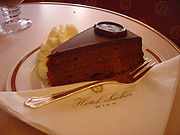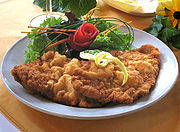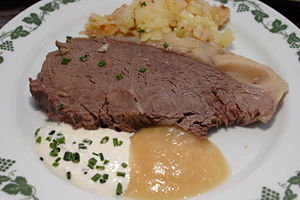
Viennese cuisine
Encyclopedia

Cuisine
Cuisine is a characteristic style of cooking practices and traditions, often associated with a specific culture. Cuisines are often named after the geographic areas or regions that they originate from...
that is characteristic of Vienna
Vienna
Vienna is the capital and largest city of the Republic of Austria and one of the nine states of Austria. Vienna is Austria's primary city, with a population of about 1.723 million , and is by far the largest city in Austria, as well as its cultural, economic, and political centre...
, Austria
Austria
Austria , officially the Republic of Austria , is a landlocked country of roughly 8.4 million people in Central Europe. It is bordered by the Czech Republic and Germany to the north, Slovakia and Hungary to the east, Slovenia and Italy to the south, and Switzerland and Liechtenstein to the...
, and its residents. Viennese cuisine is often treated as equivalent to Austrian cuisine
Cuisine of Austria
Austrian cuisine is a style of cuisine native to Austria and composed of influences from throughout the former Austro-Hungarian Empire. Regional influences from Italy, Hungary, Germany and the Balkans have had an effect on Austrian cooking, and in turn this fusion of styles was influential...
, but while elements of Viennese cuisine have spread throughout Austria, other Austrian regions have their own unique variations. Viennese cuisine is best known for its pastries, but it includes a wide range of other unique dishes.
History

Bohemian
A Bohemian is a resident of the former Kingdom of Bohemia, either in a narrow sense as the region of Bohemia proper or in a wider meaning as the whole country, now known as the Czech Republic. The word "Bohemian" was used to denote the Czech people as well as the Czech language before the word...
, Hungarian
Cuisine of Hungary
Hungarian or Magyar cuisine is the cuisine characteristic of the nation of Hungary and its primary ethnic group, the Magyars. Traditional Hungarian dishes are primarily based on meats, seasonal vegetables, fruits, fresh bread, cheeses and honey...
(particularly with Gulaschsuppe, originally a Hungarian stew), Italian
Italian cuisine
Italian cuisine has developed through centuries of social and political changes, with roots as far back as the 4th century BCE. Italian cuisine in itself takes heavy influences, including Etruscan, ancient Greek, ancient Roman, Byzantine, Jewish and Arab cuisines...
, Jewish
Jewish cuisine
Jewish Cuisine is a collection of the different cooking traditions of the Jewish people worldwide. It is a diverse cuisine that has evolved over many centuries, shaped by Jewish dietary laws and Jewish Festival and Sabbath traditions...
, Polish
Polish cuisine
Polish cuisine is a style of cooking and food preparation originating from Poland. It has evolved over the centuries due to historical circumstances. Polish national cuisine shares some similarities with other Central European and Eastern European traditions as well as French and Italian...
and Southern Slavic features in Viennese cuisine. The croissant
Croissant
A croissant is a buttery flaky pastry named for its distinctive crescent shape. It is also sometimes called a crescent, from the French word for "crescent". Croissants are made of a leavened variant of puff pastry...
is also thought to have originated in Vienna after the defeat of the Turks in the Siege of Vienna
Siege of Vienna
The Siege of Vienna in 1529 was the first attempt by the Ottoman Empire, led by Suleiman the Magnificent, to capture the city of Vienna, Austria. The siege signalled the pinnacle of the Ottoman Empire's power, the maximum extent of Ottoman expansion in central Europe, and was the result of a...
.

Modern Viennese cuisine
In modern Vienna, many chefs have begun to combine traditional Viennese dishes with the principles of nouvelle cuisineNouvelle Cuisine
Nouvelle cuisine is an approach to cooking and food presentation used in French cuisine. By contrast with cuisine classique, an older form of French haute cuisine, nouvelle cuisine is characterized by lighter, more delicate dishes and an increased emphasis on presentation.-History:The term...
to create what is known as "Neue Wiener Küche" (New Viennese cuisine). Also, Turkish
Turkish cuisine
Turkish cuisine is largely the heritage of Ottoman cuisine, which can be described as a fusion and refinement of Central Asian, Middle Eastern and Balkan cuisines. Turkish cuisine has in turn influenced those and other neighbouring cuisines, including that of western Europe...
, Jewish
Jewish cuisine
Jewish Cuisine is a collection of the different cooking traditions of the Jewish people worldwide. It is a diverse cuisine that has evolved over many centuries, shaped by Jewish dietary laws and Jewish Festival and Sabbath traditions...
, Middle Eastern
Middle Eastern cuisine
Middle-Eastern cuisine, West Asian cuisine, or in some place in the United States, Persian-Mediterranean cuisine is the cuisine of the various countries and peoples of the Middle East . The cuisine of the region is diverse while having a degree of homogeneity...
, and Indian cuisine
Indian cuisine
Indian cuisine consists of thousands of regional cuisines which date back thousands of years. The dishes of India are characterised by the extensive use of various Indian spices, herbs, vegetables and fruit. Indian cuisine is also known for the widespread practice of vegetarianism in Indian society...
have influence on the city because of growing immigrant communities.
Viennese dishes

- ApfelstrudelApfelstrudelApple strudel is a traditional Viennese strudel, a popular pastry in Austria and in many countries in Europe that once belonged to the Austro-Hungarian empire .-History:...
(an apple-filled pastry) - Topfenstrudel (a quark cheeseQuark (cheese)Quark is a type of fresh cheese, also known as tvorog , topfen , biezpiens , and varškė . It is made by warming soured milk until the desired degree of denaturation of milk proteins is met, and then strained...
-filled strudelStrudelA strudel is a type of layered pastry with a — most often sweet — filling inside, often served with cream. It became well known and gained popularity in the 18th century through the Habsburg Empire....
) - PalatschinkenPalatschinkenPalatschinke is the Austrian and Bavarian name of the thin, crêpe-like variety of pancake common in Central and Eastern Europe.-The pancake:...
(Viennese crêpes, from the Slovak palacinka) - PowidlPowidlPowidl is a plum stew. Unlike jam or marmalade, and unlike the German Pflaumenmus , powidl is prepared without additional sweeteners or gelling agents....
- BuchtelnBuchtelnBuchteln are sweet dumplings made of yeast dough, filled with jam, poppy seed paste or curd and baked in a large pan so that they stick together. The traditional Buchtel is filled with plum powidl jam...
(yeast and butter baked good filled with apricot jam) - Wiener SchnitzelWiener schnitzelSchnitzel is a traditional Austrian dish made with boneless meat thinned with a mallet , coated in bread crumbs and fried. It is a popular part of Viennese, Austrian cuisine and German Cuisine...
- SachertorteSachertorteSachertorte is a chocolate cake. It was invented by chance by Austrian Jewish Franz Sacher in 1832 for Klemens Wenzel von Metternich in Vienna, Austria. It is one of the most famous Viennese culinary specialties. The Original Sachertorte is only made in Vienna and Salzburg, and it is shipped from...
(a chocolate cake) - TafelspitzTafelspitzTafelspitz is boiled beef in broth Viennese style.- The dish :Tafelspitz - boiled tri-tip - is a typical Austrian dish. The beef is simmered along with root vegetables and spices in the broth...
(boiled beef, often served with apple and horseradish sauces) - Gulasch (a hotpot similar to Hungarian pörkölt - gulyás is a soup in Hungary)
- Selchfleisch (smoked meat) with SauerkrautSauerkrautSauerkraut , directly translated from German: "sour cabbage", is finely shredded cabbage that has been fermented by various lactic acid bacteria, including Leuconostoc, Lactobacillus, and Pediococcus. It has a long shelf-life and a distinctive sour flavor, both of which result from the lactic acid...
und dumplings. - Rindsuppe (beef soup)
- Beuschel (a ragoutRagout-Etymology:The term comes from the French ragoûter, to revive the taste. The etymologically related Italian ragù is a sauce such as Bolognese used typically to dress pasta.-Preparation:...
containing vealVealVeal is the meat of young cattle , as opposed to meat from older cattle. Though veal can be produced from a calf of either sex and any breed, most veal comes from male calves of dairy cattle breeds...
lungs and heart) - LiptauerLiptauerLiptauer is a spicy cheese spread made with sheep milk cheese, goat's milk cheese, quark cheese or cottage cheese. It is a part of Slovak cuisine , Hungarian cuisine , Austrian cuisine and Italian cuisine...
cheese - GermknödelGermknödelGermknödel is a fluffy yeast dough dumpling with a mix of poppy seeds and sugar, filled with spicy plum jam and melted butter on top, often eaten with vanilla cream sauce....
- MarillenknödelMarillenknödelMarillenknödel are a pastry. They are found in the traditional Bohemian and Viennese cuisines. "Marillen" is the Austrian term for apricots and this pastry is found predominantly in areas where apricot orchards are common. Examples of such areas would include the Wachau and Vinschgau.Small...
The Danish pastry
Danish pastry
Danish pastry is a sweet pastry which has become a specialty of Denmark and neighbouring Scandinavian countries and is popular throughout the industrialized world, although the form it takes can differ significantly from country to country...
is said to originate from Vienna
Vienna
Vienna is the capital and largest city of the Republic of Austria and one of the nine states of Austria. Vienna is Austria's primary city, with a population of about 1.723 million , and is by far the largest city in Austria, as well as its cultural, economic, and political centre...
and in Denmark is called wienerbrød (Viennese bread). But that is probably because it uses a certain kind of dough consisting of butter and flour in the classic cuisine referred to as "Viennese Dough".
This pastry is called "Kolatsche" (from the Czech koláč from kolo for wheel) in Viennese.

